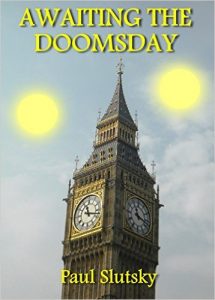 Awaiting the Doomsday is an alien invasion story with an intriguing premise: a second sun suddenly appears in the sky. Astrophysicist Alan Norton makes the discovery that the object has a trajectory unlike any planet. Norton, along with other worldwide scientific leaders from Russia and Japan, among others, is tasked with contacting the craft to understand its motives.
Awaiting the Doomsday is an alien invasion story with an intriguing premise: a second sun suddenly appears in the sky. Astrophysicist Alan Norton makes the discovery that the object has a trajectory unlike any planet. Norton, along with other worldwide scientific leaders from Russia and Japan, among others, is tasked with contacting the craft to understand its motives.
Obviously a civilization that could travel through space is highly advanced, and so potentially dangerous. Some just want to nuke the thing out of orbit immediately. Norton must stem the paranoia in order to save the human race from a self-created disaster.
Though the premise of alien invasion is not a new one, Slutsky takes it in a new direction. It’s more hard sci-fi than something like “Independence Day” and others, which is often about military grunt work. There’s a lot of hard politics as well – or, rather, the politics of science, where scientists and politicians debate how to go forward with the alien menace.
On that front, the debate is a little too one-dimensional. One side of the debate comes down to: there’s a light in the sky from an advanced craft, they must be here to enslave us, so we must kill them. There is no proof for this leap of logic, and even the most militant would regard this move as potentially catastrophic. So the debate is somewhat frustrating, as the players aren’t being entirely rational. Woven into these discussions are interesting details about how the human race might deal with such a problem, and certainly there would be some “shoot first” types, but the debate is not as well-reasoned as it could be.
Given that there is a lot of dialog in the book, there is one glaring editorial problem that makes the novel a difficult read. Slutsky has chosen to use em-dashes instead of quote marks for dialog, which makes it rough going at times to surmise what is dialog and what isn’t. Here’s a sample:
—Buddy. He turned to the guy named Shelton. —Actually they, he said, turning his eyes up in the direction of the disk, —still haven’t done anything wrong. Actually they could if they wanted to. They might not be thinking to fight and you’re just getting caught up in fear?
There is value in this technique, and it’s of course not unheard of, but it makes a bit more sense with a literary novel that’s playing with form (see: James Joyce or Irvine Welsh) than a potboiler about alien invasion. When used effectively, the technique can give dialog the same weight as description. In this novel, it’s just confusing.
This is a shame because it’s an interesting book with interesting ideas at work. Slutsky has just not really gone far enough in exploring the premise. It’s not just that we don’t know the motivations of this mysterious alien race, the motivations of the humans are equally mysterious. As the book opens up questions for a sequel, it might have been better served answering those questions here, as a fully realized narrative arc would make the novel both more realistic and engaging.
Review Overview
Design
Editing
Content
Get an Editorial Review | Get Amazon Sales & Reviews | Get Edited | Get Beta Readers | Enter the SPR Book Awards | Other Marketing Services























Leave A Comment